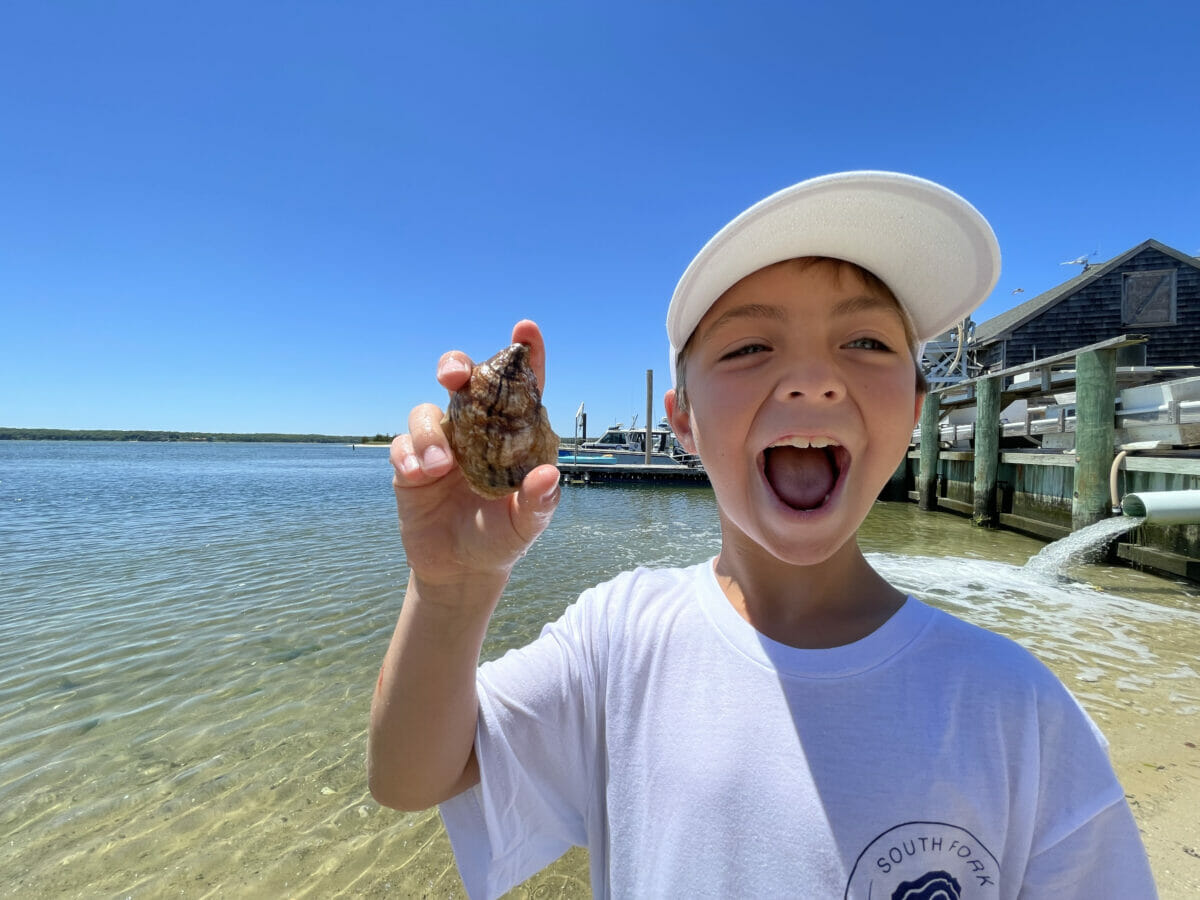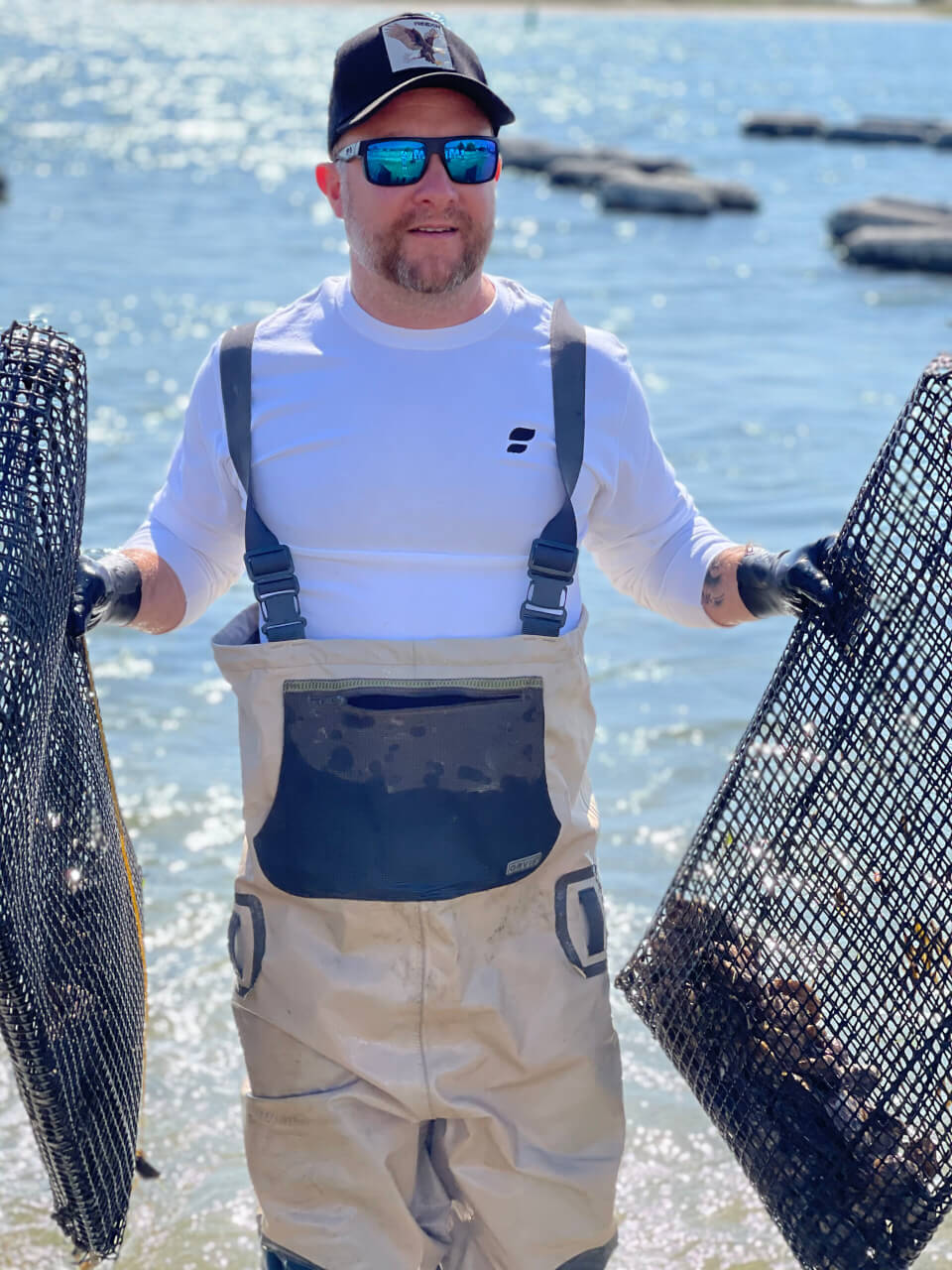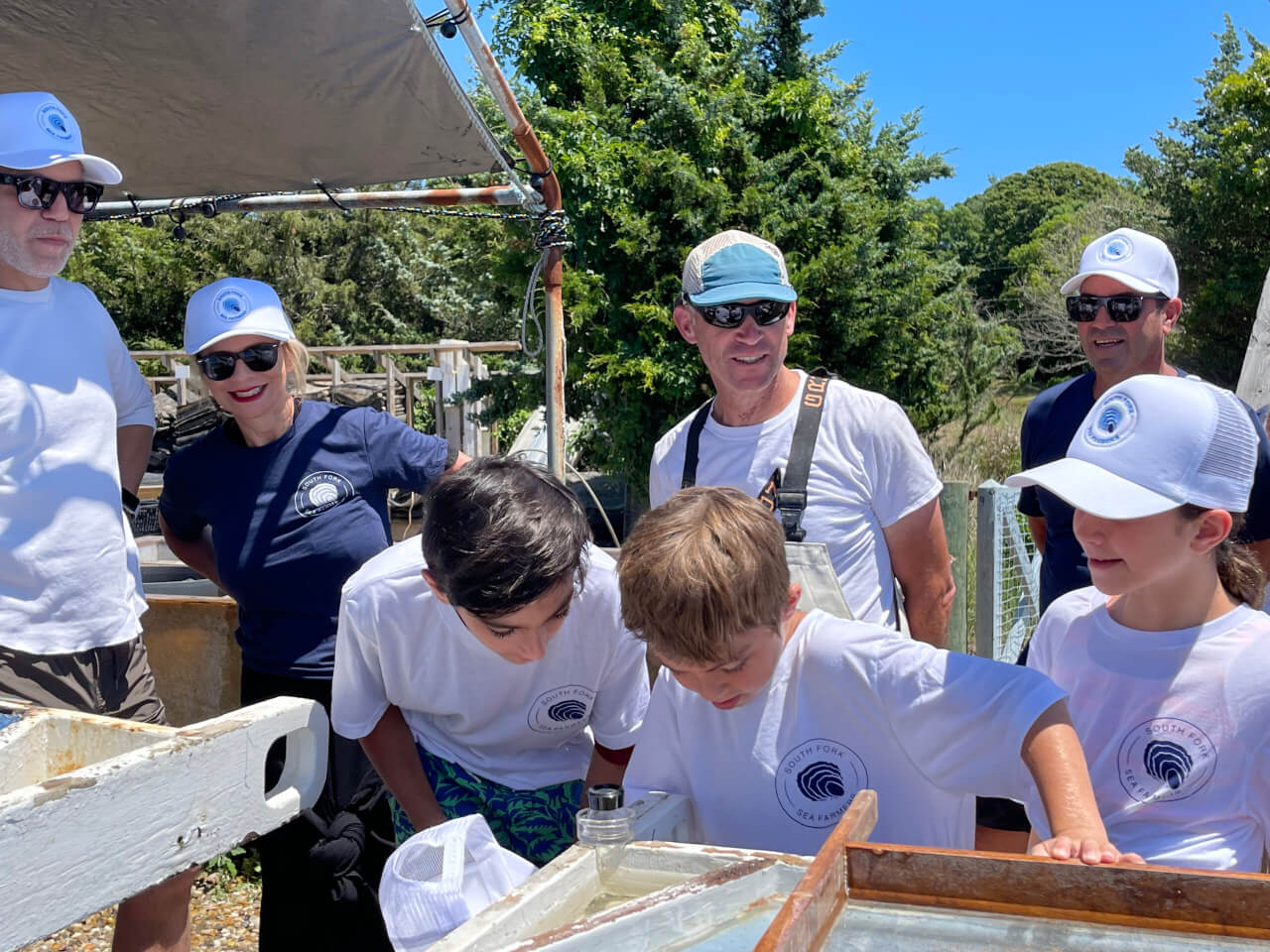Meet The Modern Farmers Creating Public Oyster Gardens
South Fork Sea Farmers helps families grow their own oysters and see the importance of sustainable marine aquaculture up close.
Meet The Modern Farmers Creating Public Oyster Gardens
South Fork Sea Farmers helps families grow their own oysters and see the importance of sustainable marine aquaculture up close.

150 families near Long Island will be able to grow their own oysters this summer. Photography courtesy South Fork Sea Farmers
Picture yourself harvesting oysters you grew yourself, sharing them with friends and family. Sound dreamy? It’s a reality for more than 100 New York families that, come July, will be shucking their very own shellfish. The participating families get access to grow bags, 1,000 baby oysters, called spat, and 100 fully grown oysters, plus space to farm on a public plot, all courtesy of South Fork Sea Farmers.
The Long Island-based nonprofit organization works to raise awareness of sustainable marine aquaculture through public oyster gardening and other sea farming activities. Oysters are one of the most environmentally friendly and sustainable protein sources. They help filter out pollutants in the water, keep the population of phytoplankton in check, and create habitat for other marine life. South Fork Sea Farmers helps the waters off of Long Island reap all those benefits, while connecting people to a food source and teaching them about oyster farming.
“A single oyster filters 50 gallons of water a day,” says Jeff Ragovin, a board member with the South Fork Sea Farmers. “The oyster gardens are really amazing for the marine environment, providing habitat to shrimp, crabs, sea bass, and black fish. While the oysters aren’t for sale, the people growing the oysters get to harvest them for their friends and family.”

Program participants pay a yearly fee of $200 for the equipment, and, in return, South Fork Sea Farmers asks for 200 oysters back from each plot, allowing it to continue seeding the public gardens. Participants can expect to grow up to 1,000 oysters, ready to eat, over the course of the season.
“It’s a super-sustainable, good-for-the-earth program,” says Ragovin.
Since it started, the program has grown to five harbors off the coast of Long Island. Last summer, with several partner organizations, it started a new reef in the waters off of Accabonac Harbor. South Fork Sea Farmers had students from East Hampton, NY schools sign up to help build the reefs, using bags of recycled oyster shells upon which spat will settle and grow. Those students will continue to monitor the reef’s progress as part of an educational project.
read more
The Oyster Farmers Working to Address Aquaculture’s Big Plastics Problem
“We wanted to build a reef for years, but it took time to get the permit and do the shell collection,” says Ragovin. South Fork Sea Farmers purchased biodegradable bags from the Netherlands and filled them with used oyster shells collected from local restaurants to form the foundation of the new reef.
After the shells were collected from restaurants, they had to cure for about six months before they were ready to be placed on the reef. While this reef is built from oyster shells, the waters off New York are also home to several artificial reefs built out of hard structures such as clean, recycled Tappan Zee Bridge material and jetty rock. As those artificial reefs, the first of which was built in the 1940s, tend to collapse over time, the New York State Department of Environmental Conservation, which builds and maintains those reefs, adds materials back to them every few years. The state hopes that, in addition to creating habitats for marine life, the reefs stimulate a productive aquatic ecosystem, increasing marine biodiversity as corals, mussels, snails, crabs and larger fish start to call them home. They also protect the shoreline from flooding and erosion and can decrease the energy of intense storms, and the Accabonac Harbor reef will provide space for more oyster gardening.

South Fork Sea Farmers hopes that, in addition to building more oyster reefs locally, it can help inspire other municipalities and organizations to start their own public oyster gardens.
“We get people all over the country reaching out and asking how they can do something similar, so we’re working on putting together a guide of how to do it,” says Ragovin. “It’s been really a fun and exciting opportunity to see people in the local community be stewards of the environment.
The program has grown to an expected 150 families for the 2023 season, from an initial 15 pilot families, with many families including the original 15 coming back year after year.
If your local town isn’t quite ready for such a program or you don’t live along the coast, you can still witness some of South Fork Sea Farmers’ work when it live streams the oyster spawn next week.
Follow us
This work is licensed under a Creative Commons Attribution-NoDerivatives 4.0 International License.
Want to republish a Modern Farmer story?
We are happy for Modern Farmer stories to be shared, and encourage you to republish our articles for your audience. When doing so, we ask that you follow these guidelines:
Please credit us and our writers
For the author byline, please use “Author Name, Modern Farmer.” At the top of our stories, if on the web, please include this text and link: “This story was originally published by Modern Farmer.”
Please make sure to include a link back to either our home page or the article URL.
At the bottom of the story, please include the following text:
“Modern Farmer is a nonprofit initiative dedicated to raising awareness and catalyzing action at the intersection of food, agriculture, and society. Read more at <link>Modern Farmer</link>.”
Use our widget
We’d like to be able to track our stories, so we ask that if you republish our content, you do so using our widget (located on the left hand side of the article). The HTML code has a built-in tracker that tells us the data and domain where the story was published, as well as view counts.
Check the image requirements
It’s your responsibility to confirm you're licensed to republish images in our articles. Some images, such as those from commercial providers, don't allow their images to be republished without permission or payment. Copyright terms are generally listed in the image caption and attribution. You are welcome to omit our images or substitute with your own. Charts and interactive graphics follow the same rules.
Don’t change too much. Or, ask us first.
Articles must be republished in their entirety. It’s okay to change references to time (“today” to “yesterday”) or location (“Iowa City, IA” to “here”). But please keep everything else the same.
If you feel strongly that a more material edit needs to be made, get in touch with us at [email protected]. We’re happy to discuss it with the original author, but we must have prior approval for changes before publication.
Special cases
Extracts. You may run the first few lines or paragraphs of the article and then say: “Read the full article at Modern Farmer” with a link back to the original article.
Quotes. You may quote authors provided you include a link back to the article URL.
Translations. These require writer approval. To inquire about translation of a Modern Farmer article, contact us at [email protected]
Signed consent / copyright release forms. These are not required, provided you are following these guidelines.
Print. Articles can be republished in print under these same rules, with the exception that you do not need to include the links.
Tag us
When sharing the story on social media, please tag us using the following: - Twitter (@ModFarm) - Facebook (@ModernFarmerMedia) - Instagram (@modfarm)
Use our content respectfully
Modern Farmer is a nonprofit and as such we share our content for free and in good faith in order to reach new audiences. Respectfully,
No selling ads against our stories. It’s okay to put our stories on pages with ads.
Don’t republish our material wholesale, or automatically; you need to select stories to be republished individually.
You have no rights to sell, license, syndicate, or otherwise represent yourself as the authorized owner of our material to any third parties. This means that you cannot actively publish or submit our work for syndication to third party platforms or apps like Apple News or Google News. We understand that publishers cannot fully control when certain third parties automatically summarize or crawl content from publishers’ own sites.
Keep in touch
We want to hear from you if you love Modern Farmer content, have a collaboration idea, or anything else to share. As a nonprofit outlet, we work in service of our community and are always open to comments, feedback, and ideas. Contact us at [email protected].by Bridget Shirvell, Modern Farmer
February 9, 2023
Modern Farmer Weekly
Solutions Hub
Innovations, ideas and inspiration. Actionable solutions for a resilient food system.
ExploreExplore other topics
Share With Us
We want to hear from Modern Farmer readers who have thoughtful commentary, actionable solutions, or helpful ideas to share.
SubmitNecessary cookies are absolutely essential for the website to function properly. This category only includes cookies that ensures basic functionalities and security features of the website. These cookies do not store any personal information.
Any cookies that may not be particularly necessary for the website to function and are used specifically to collect user personal data via analytics, ads, other embedded contents are termed as non-necessary cookies.
Wicked cool! Envious! We have farmed shrimp in Montana, maybe shellfish is next 🤔